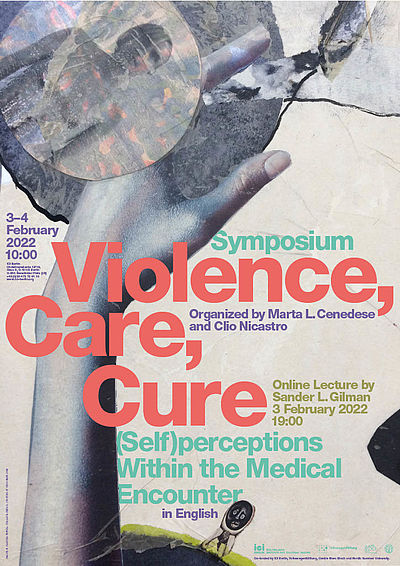Violence, Care, Cure: (Self)perceptions Within the Medical Encounter
February 03 | 10:00
Since the 1980s, scholars in the interdisciplinary field of the medical humanities have foregrounded how the distinction between ‘disease’, i.e. the medical classification of symptoms, and the individual experience of illness can be generative to unlock the tensions within the medical encounter. The doctor and the patient may tell two very different stories of illness, even contradictory ones. The mismatch that often arises between the medical gaze (Michel Foucault, 1963) and the individual’s gaze in the face of the same event can be productively addressed by paying attention to their visual and narrative representations. In addition, the ways diseases have been portrayed with words and images have also affected the (self)perception of the body through history. If medicine is about stories (the patients’, doctors’, science’s, society’s), when and where do conflicts and misunderstandings arise that turn the cure into something perceived as violence? Literary and visual narratives
contribute to sharing these stories and can offer a vantage point to address larger cultural scripts. How do these narratives represent perceptions of violence within medical settings and practices?
The two-day symposium seeks to address the ambiguities of and tensions among perceptions at the cusp of internal (subjective) and external (social, cultural, political) ‘gazes’. What the individual experiences, at either end of the consultation room, is a complex interlacing of personal vicissitudes, global structures, and community practices: a prismatic network in which ‘care’ and ‘violence’ are reflected and refracted in a variety of oftentimes overlapping and divergent interpretative modes. Communities (whether concrete, virtual, or imagined) can be perceived as both providers of care and support, as well as instigators of violence.
A case in point mirroring this ambiguity are for instance online pro-anorexia and pro-bulimia communities, where users create a space to share their experiences of eating disorders while at the same time promoting self-disruptive food behaviours. Another telling example is constituted by the outcomes of the ongoing pandemic; the alliance of extreme right-wing movements with anti-vaxers, and the protests against governments’ covid-related sanitary measures or the green pass (dubbed a ‘sanitary dictatorship’) have exposed the infiltration of radical ideologies and conspiracies into medical discourse, whereby care and violence lose their neat distinction. While a black and white opposition between internal/external, care/neglect, cure/violence may seem reductionist, engagement with these seemingly contrasting attitudes reveals the complex entanglements among possible scientific dogmatic drifts, social inequalities within healthcare systems, and idiosyncratic projections of individual and collective fears, which often lead to stigmatizing certain collectivities for the origin or transmission of contagious diseases (Zhao Xun and Sander L. Gilman, 2021).
https://www.ici-berlin.org/events/violence-care-cure/#1559655155442-ff9bb510-ecca4adc-59d6
Contact
Marta-Laura Cenedese
marta.cenedese ( at ) utu.fi
Partners
ICI Berlin, VolkswagenStiftung
Location
ICI Berlin Institute for Cultural InquiryChristinenstr. 18/19, Haus 8
10119 Berlin
